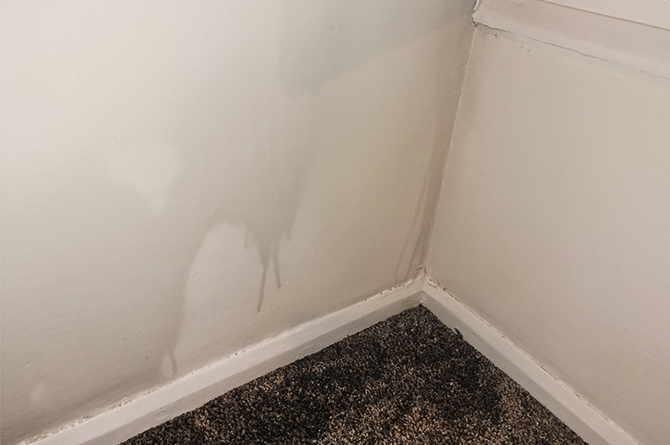Support quality, independent, local journalism…that matters
From just £1 a month you can help fund our work – and use our website without adverts. Become a member today

A specialist NHS midwife has written to the council “significantly concerned” about a family’s health because of living conditions in their local authority flat.
Caeron Jenkins lives in a two-bedroom flat in Pontlottyn with his pregnant partner Kim Smith and their baby daughter. The couple say they live in “wet” and “damp” conditions.
Caerphilly Observer first featured their story last month.
We can now reveal that a specialist midwife for perinatal mental health, from Aneurin Bevan University Health Board has written to Caerphilly County Borough Council.
In the letter, sent to the council earlier this month, the midwife wrote: “I am concerned for the safety of the child already at this address, and significantly concerned about the safety of a new born baby having to live in this environment.”
She added: “Kim already has a young child, and when I first met the family I was concerned that this child had significantly noisy breathing and signs of a respiratory infection, additionally the child smelled of damp.
“When I asked the family about this they explained that the child was recovering from a repeat infection and they believed this was due to their living conditions, particularly the condition of their house.
“Research shows children are particularly vulnerable to the adverse health effects from mo[u]ld and damp. These effects include respiratory problems, respiratory infections, allergies and asthma.
“Damp and mould can also affect the immune system, which is immature in a newborn and altered in pregnancy, making this family vulnerable.”
The midwife was also concerned with the mental wellbeing of mother Kim because of the extra stress their living conditions brought.
Caeron Jenkins, Kim’s partner and the child’s father, had previously contacted Caerphilly Observer to highlight the poor condition of the flat and explained how the situation has affected his mental health, work, and personal relationships.
He said that the poor condition of the two bedrooms had forced all members of the family to sleep in the living room.
Speaking to Caerphilly Observer in December Mr Jenkins also said: “It’s breaking me down,” adding that the family were struggling to heat the property – during a cold snap – due to draughty windows.
He said: “There’s air coming through every one of them,” about the windows, adding that despite “using more electric[ity], more gas just to keep…the house warm” – the property was still cold.
Mr Jenkins got back in touch with Caerphilly Observer for further help in January – the situation had not improved and his daughter had just been rushed into the hospital with a chest infection.
Mr Jenkins hopes that repairs will be made as quickly as possible but ultimately wishes to leave the property.
What is ‘suitable’ council accommodation?
According to Shelter Cymru, a council has to consider if the accommodation is suitable for the tenant and all members of their household before they make the offer.
Here’s what a council will need to consider:
- If the accommodation is the right size for the household
- If the condition of the accommodation is good enough
- If the accommodation is a good fit for the household (e.g. there are no steep stairs for someone with mobility issues)
- If the accommodation is affordable for the household
- If the accommodation is in a suitable location (e.g. it will not have a negative impact on the household’s working schedule)
In response to the ongoing situation and the letter from the specialist nurse, a spokesperson for Caerphilly County Borough Council said repairs at the flat are due to be completed this week, but suggested a lack of heating could be the cause of the damp.
They said: “Cavity at the flat has been checked at separate locations and on both checks was found to be dry. A datalogger was also installed at the flat to monitor conditions and use of the heating system to provide us with a better understanding of the cause of the issues. The results from the datalogger demonstrated that the values of relative humidity in the property are excessively high which represents a serious condensation risk.
“The datalogger also showed that the temperature in the property is barely above 10°C and only goes above 13°C on two occasions. The lack of variation in temperature up and down suggests that the heating is not being used as it should, which is exacerbating the condensation problem.
“Our staff are continuing to liaise with Mr Jenkins to resolve the issues at his home, including advice from our Principal Building Surveyor on ways to prevent condensation. We understand that the current cost of living crisis and rising energy bills are a concern and have provided the family with specialist advice from our Housing Support Service.
“In addition, we understand that Mr Jenkins wishes to relocate, and our officers are advising him on completion of a transfer application.”
Support quality, independent, local journalism…that matters
From just £1 a month you can help fund our work – and use our website without adverts.
Become a member today
